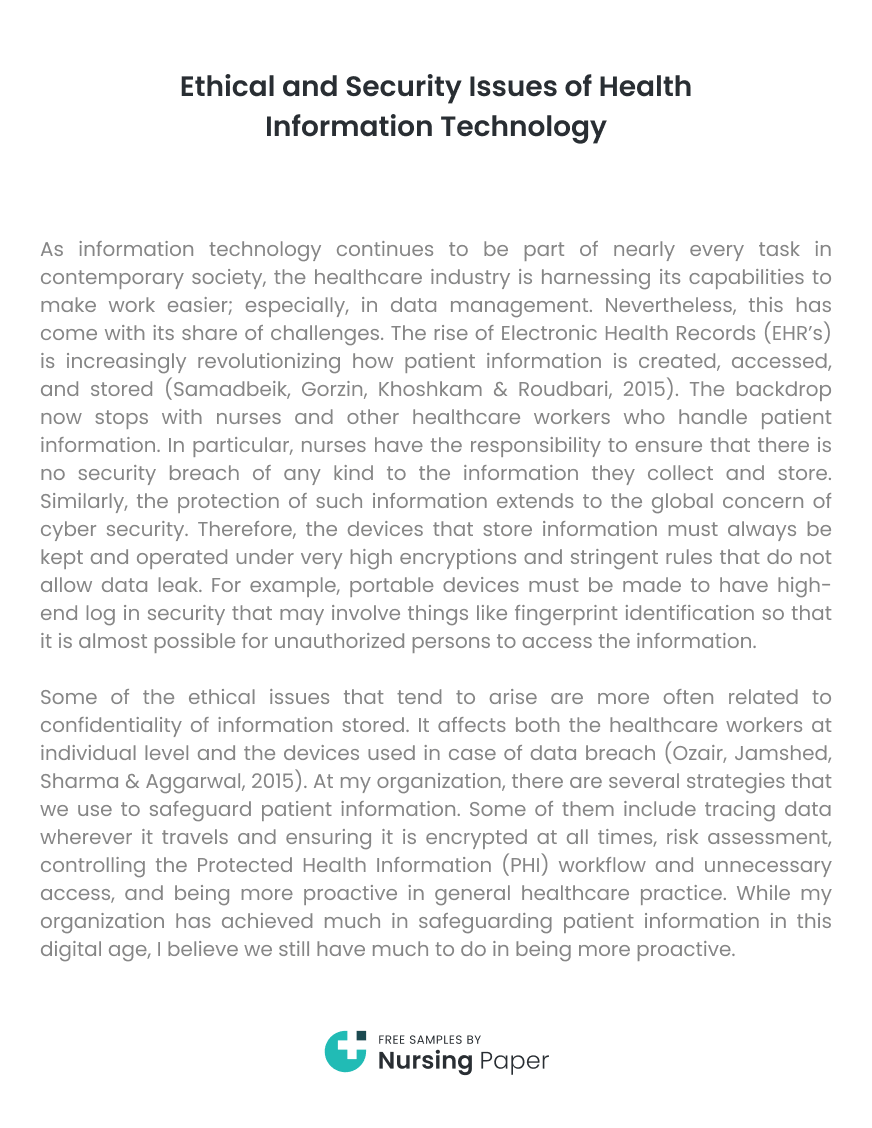
Ethical and Security Issues of Health Information Technology
Introduction
As information technology continues to be part of nearly every task in contemporary society, the healthcare industry is harnessing its capabilities to make work easier; especially, in data management. Nevertheless, this has come with its share of challenges. The rise of Electronic Health Records (EHR’s) is increasingly revolutionizing how patient information is created, accessed, and stored (Samadbeik, Gorzin, Khoshkam & Roudbari, 2015). The backdrop now stops with nurses and other healthcare workers who handle patient information. In particular, nurses have the responsibility to ensure that there is no security breach of any kind to the information they collect and store. Similarly, the protection of such information extends to the global concern of cyber security. Therefore, the devices that store information must always be kept and operated under very high encryptions and stringent rules that do not allow data leak. For example, portable devices must be made to have high-end log in security that may involve things like fingerprint identification so that it is almost possible for unauthorized persons to access the information.
Some of the ethical issues that tend to arise are more often related to confidentiality of information stored. It affects both the healthcare workers at individual level and the devices used in case of data breach (Ozair, Jamshed, Sharma & Aggarwal, 2015). At my organization, there are several strategies that we use to safeguard patient information. Some of them include tracing data wherever it travels and ensuring it is encrypted at all times, risk assessment, controlling the Protected Health Information (PHI) workflow and unnecessary access, and being more proactive in general healthcare practice. While my organization has achieved much in safeguarding patient information in this digital age, I believe we still have much to do in being more proactive. It is commonplace that healthcare organizations that go above and beyond the stipulated data protection requirements thrive and are often preferred by patients. Addressing this would require an improvement in organizational culture and values that are aimed to make workers love their work passionately and treat it as primary responsibility just like one would care for their child.


1. Ozair, F. F., Jamshed, N., Sharma, A., & Aggarwal, P. (2015). Ethical issues in electronic health records: A general overview. Perspectives in Clinical Research, 6 (2), 73–76. http://doi.org/10.4103/2229-3485.153997.
2. Samadbeik, M., Gorzin, Z., Khoshkam, M., & Roudbari, M. (2015). Managing the Security of Nursing Data in the Electronic Health Record. Acta Informatica Medica, 23 (1), 39–43. http://doi.org/10.5455/aim.2015.23.39-43.



The download will start shortly.

The download will start shortly.
 Subject:
Health and Social Care
Subject:
Health and Social Care  Number of pages: 7
Number of pages: 7  Subject:
Health and Social Care
Subject:
Health and Social Care  Number of pages: 10
Number of pages: 10  Subject:
Health and Social Care
Subject:
Health and Social Care  Number of pages: 2
Number of pages: 2  Subject:
Health and Social Care
Subject:
Health and Social Care  Number of pages: 5
Number of pages: 5  Subject:
Health and Social Care
Subject:
Health and Social Care  Number of pages: 3
Number of pages: 3  Subject:
Health and Social Care
Subject:
Health and Social Care  Number of pages: 4
Number of pages: 4  Subject:
Nursing
Subject:
Nursing  Number of pages: 6
Number of pages: 6  Subject:
Nursing
Subject:
Nursing  Number of pages: 13
Number of pages: 13  Subject:
Health and Social Care
Subject:
Health and Social Care  Number of pages: 2
Number of pages: 2  Subject:
Health and Social Care
Subject:
Health and Social Care  Number of pages: 13
Number of pages: 13  Subject:
Medicine
Subject:
Medicine  Number of pages: 3
Number of pages: 3  Subject:
Medicine
Subject:
Medicine  Number of pages: 14
Number of pages: 14  Subject:
Health and Social Care
Subject:
Health and Social Care  Number of pages: 2
Number of pages: 2  Subject:
Nursing
Subject:
Nursing  Number of pages: 5
Number of pages: 5  Subject:
Health and Social Care
Subject:
Health and Social Care  Number of pages: 2
Number of pages: 2 
